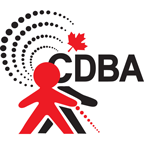Beliefs
Individualized lifelong Intervention is a right for every person who is deafblind.
Intervention will provide the best possible opportunity to: Communicate, Access information, Make choices (Regarding: education, recreation, vocations, accommodation, medical, physical, spiritual, and emotional care), and Be included in the community
All persons who are deafblind should live in a safe, healthy environment and have the self respect and dignity due every Canadian
People who are deafblind should have access to continuous appropriate education and training from the time of identification
Partnership is important and must include: the individual who is deafblind, the family, the community and the professionals involved.
Goals
Promote deafblindness as a "unique" disability
Develop a CDBA definition of DEAFBLINDNESS; Utilize assessment protocol to identify individuals who are deafblind; Develop a national Registry of Canadians who are deafblind Prepare a Data Bank of Services specific of deafblindness
Promote lifelong Intervention for Canadians who are deafblind
Accept the "Principles of the CDBA Concept of Intervention; Prepare further documentation on Intervention (role, evaluation guides case studies, parent perspectives professional perspectives, success indicators); Establish training criteria and curriculum for Intervention and Intervenors.
Encourage and support the development of programs to meet the CDBA principles for deafblind persons
Encourage and support Chapters that provide direct services to meet CDBA standards including but not limited to (Independent Living, Lifelong Intervention, Summer Intervention); Encourage and support government and non-government agencies which provide services, such as educational, recreational, medical, and supported living; Encourage and support Research proposals and projects (Medical: Rubella Prevention, Late onset medical symptoms, Cytomegalovirus (CMV), CHARGE Syndrome, Usher Syndrome, Acquired causes); Etiology and Recording of Information Impact of Service Provision for more than 20 years; Determine the Socio-Economic Impact of deafblindness on (The individual who is deafblind, Families Educational Systems, Communities, Employment, Extended Care facilities, Government participation); Encourage and support the development of a national Coordination Centre to maintain and disperse information from a Data Bank, Registry, and to be a contact base for networking.
Support a wide range of advocacy efforts
Public Awareness; Communications ((brochures, news magazines, publications, Internet); Fundraising
Develop effective partnerships with individuals, families, foundations, government and non-government agencies
Individual and Family support (National/Emergency Intervention Fund, Family Weekends, Workshops); Networking and information flow (use of Internet, develop a CDBA home page, communication by newsletters, other publications); Partner with foundations, government and non-government agencies on major initiatives such as research, awareness and service provisions; Assessment of CDBA's Internal Counterparts on topics such as (Formation of the organization, Sources of funding Prevention programs, Overview of service delivery).

